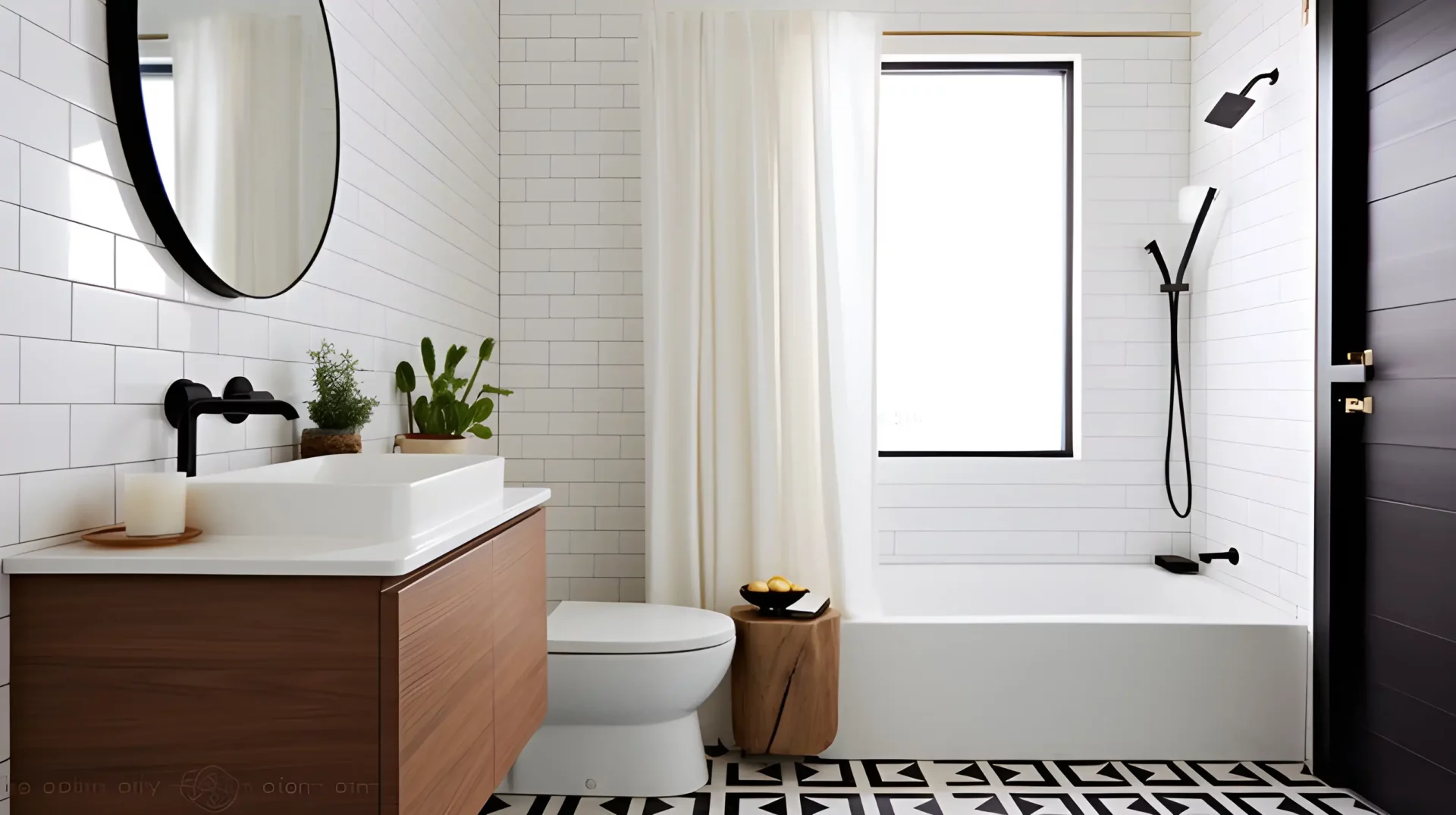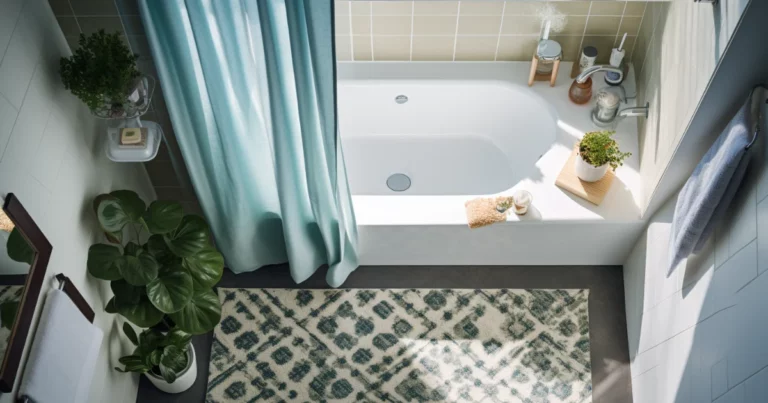Should You Leave Shower Curtain Open or Closed? A Forever Debate
You’ve likely lingered a little longer in the loo, pondering the question: Should you leave shower curtain open or closed? As a professional, you understand that it’s not just about following a routine. It’s about making an informed decision that affects the hygiene and style of your personal space.
Should you opt for openness, inviting a free flow of air and a seemingly larger bathroom? Or do you prioritize privacy and the prolonged pristine condition of your curtain? This seemingly simple choice has far-reaching implications that go beyond just aesthetics. It also touches on issues such as moisture control, mold prevention, and overall bathroom maintenance.
Stay with this discussion to uncover the layers of this everyday enigma and make the most out of your post-shower protocol.
Table of Contents
Should You Leave Shower Curtain Open or Closed? Key Takeaways
- Proper shower curtain position is important for ventilation and preventing mold and mildew growth.
- Leaving the shower curtain open allows for better air circulation. This reduces moisture and bacteria.
- Open curtains create a more inviting and spacious bathroom environment.
- Closing the curtain helps maintain privacy and a neat appearance while preventing mold and preserving the bathroom’s aesthetic appeal.
Why is the Shower Curtain Position Important?
Considering the position of your shower curtain is crucial. It can affect both the cleanliness of your bathroom and the longevity of the curtain itself. You’ve got to ensure proper ventilation to keep things dry and prevent mold and mildew from cozying up in your space.
When you’re done showering, spread the curtain out. This helps air circulate and speeds up drying. If you leave it scrunched up, you invite mold and mildew to throw a party on the folds. And trust me, they’re guests you don’t want to overstay their welcome. They’re not only unsightly, but they can also cause funky smells and potentially lead to health issues.
Reasons to Leave the Shower Curtain Open
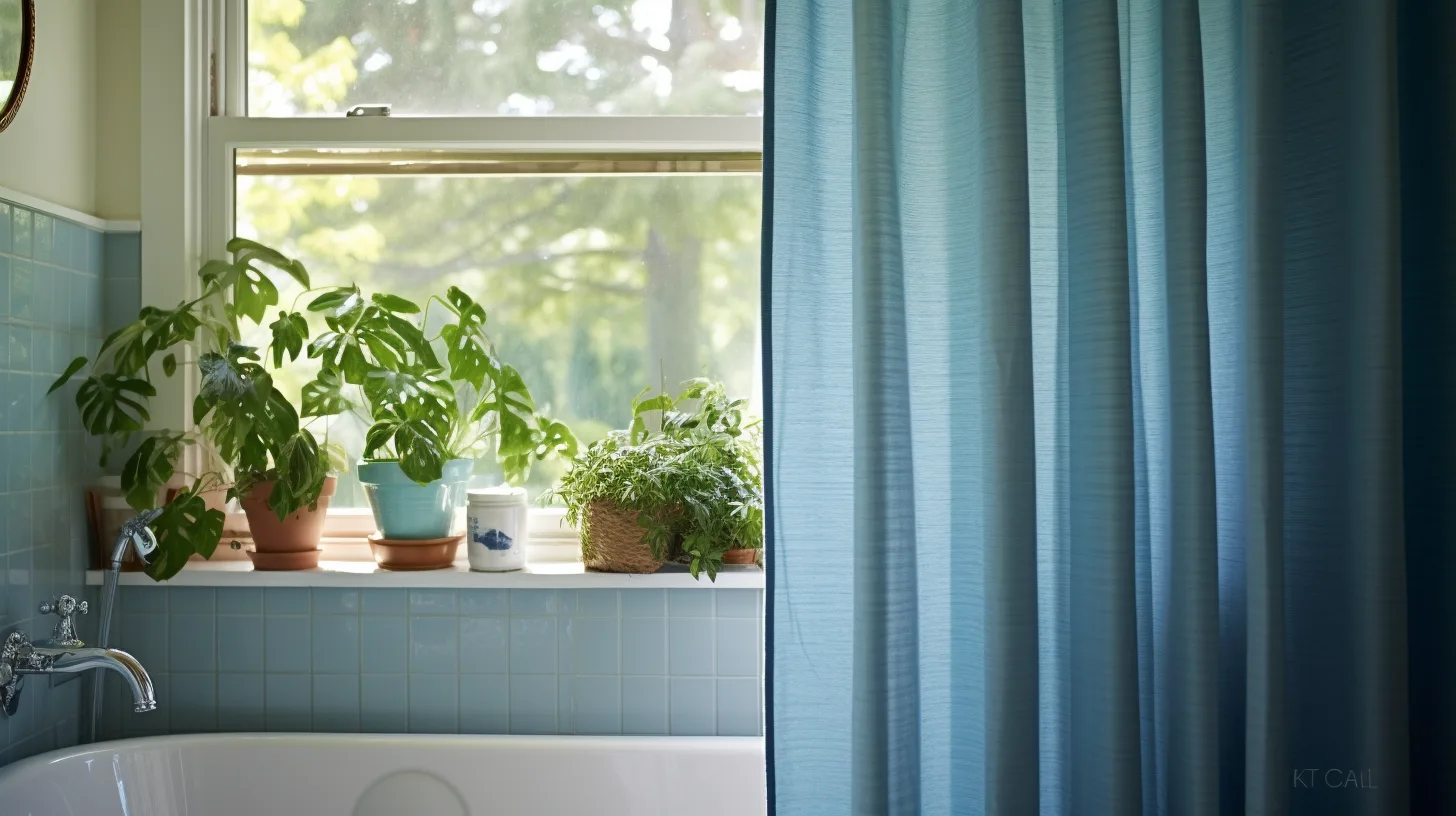
You might opt to keep your shower curtain open to promote better air circulation, which is crucial for damp bathrooms. Leaving it open can also be a simple yet effective strategy to prevent the growth of mold and mildew.
Not to mention, an open curtain can make your bathroom look bigger and more inviting.
Air Circulation
Leaving your shower curtain open after use can significantly enhance air circulation. This helps quickly dry out the bathroom and prevent mold buildup. Here are four key reasons you should consider keeping that curtain open:
- Reduce Moisture: By allowing air to flow freely, you’ll minimize the dampness that mold and mildew thrive on.
- Prevent Mold: With better air circulation, the drier environment inhibits mold growth.
- Promote Dry Air: Drier air means a less hospitable environment for bacteria and other germs.
- Freshness: If you leave the bathroom door open as well, you’ll invite even more dry air in, further ensuring a fresh atmosphere.
Mold and Mildew Prevention
While enhancing air circulation by keeping the shower curtain open is beneficial for a fresher bathroom, it’s also a critical step in preventing the growth of mold and mildew. By leaving the curtain open, you’re letting it dry out fully. This stops moisture from becoming trapped between the folds. This not only keeps mold and mildew at bay but also helps prevent the buildup of soap scum that thrives in damp conditions.
Aesthetics and Space
Often, an open shower curtain can transform a cramped bathroom into a more expansive and welcoming space. You’re not only winning a design duel against limited square footage. You’re also creating an environment that feels less claustrophobic. When you open the window to let in light, the room itself seems to grow.
Here’s why leaving the curtain open can be an attractive choice:
- It makes the bathroom look bigger, enhancing the perception of space.
- The open curtain allows for better air circulation, creating a fresher environment.
- An open shower area is more inviting, at least appearing open-minded about the room’s design.
- It streamlines access to the tub, making daily routines smoother and less confined.
Reasons to Leave the Shower Curtain Closed
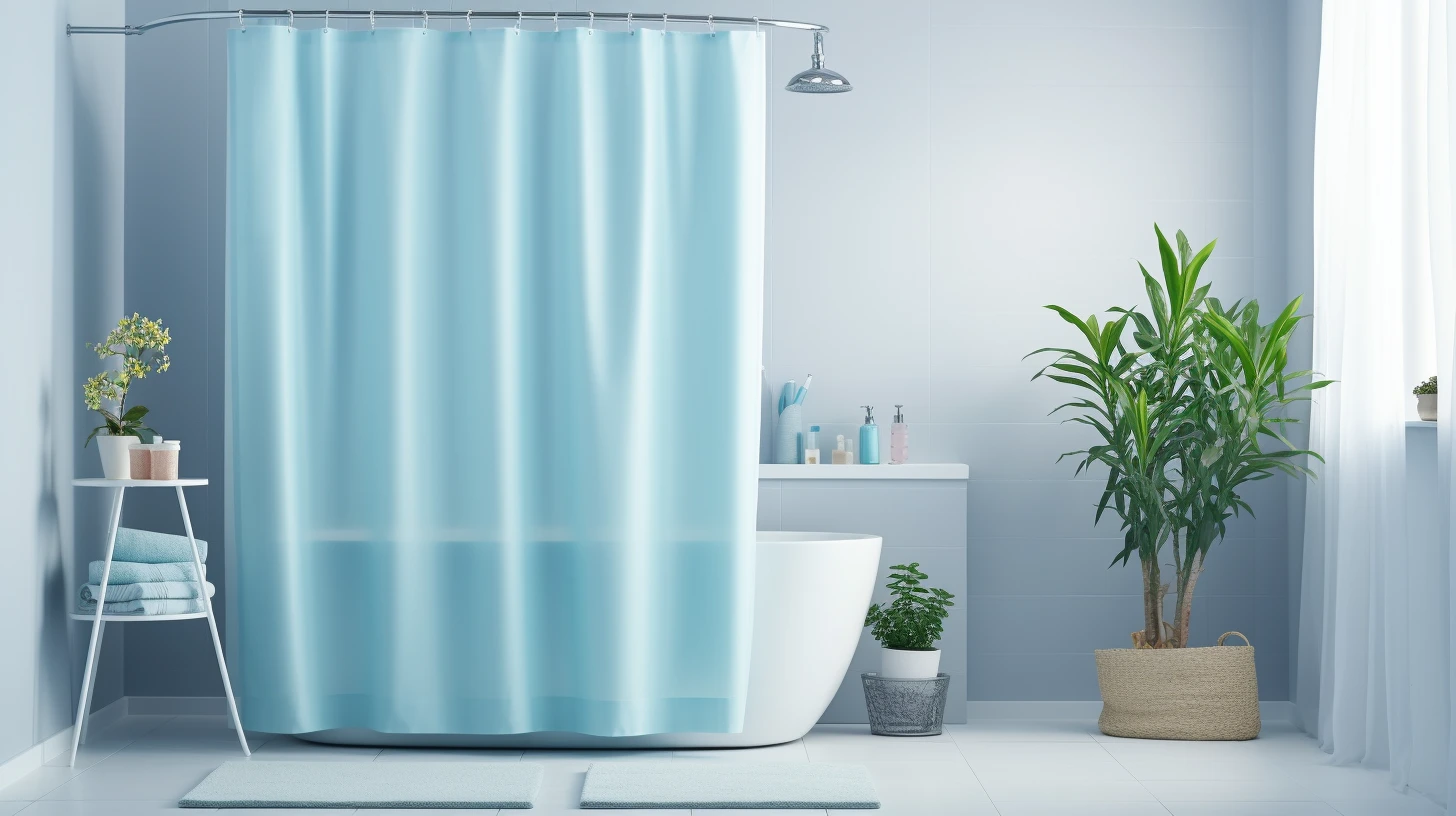
You might want to keep your shower curtain closed to help the liner dry without creases, maintaining the neat appearance of your bathroom.
Closing it also ensures your privacy, especially if you share the space with others.
Moreover, a closed curtain keeps the aesthetic appeal of your bathroom intact, presenting a tidy and organized look.
Liner Drying
Closing your shower curtain after use can significantly reduce the risk of mold and mildew growth by allowing the liner to dry more effectively. When you leave the shower liner spread out and closed, it ensures the entire surface area is exposed to air, enhancing liner drying. It also keeps the liner inside the tub, which prevents water from dripping onto the bathroom floor. Additionally, closing the shower curtain minimizes the folds where mildew and mold are prone to developing, maintaining a cleaner shower space. Finally, closing the curtain promotes a routine where the liner dries between uses, reducing the need for frequent cleaning or replacement.
Maintaining Aesthetics
Maintaining the aesthetic appeal of your bathroom may lead you to keep the shower curtain closed. This hides the tub area and presents a tidier appearance. After all, the last thing you want is for guests to see a cluttered tub space when they walk in. Closing the shower curtains ensures that your bathroom maintains a clean, organized look.
Plus, it’s not just about looks. Keeping the curtain closed also helps prevent mold and mildew, which can quickly turn a chic bathroom into a health hazard. And if you’re concerned about privacy, a closed curtain safeguards your personal space.
Privacy Considerations
While aesthetics are important, don’t overlook the privacy that a closed shower curtain offers. It ensures your personal space remains just that—personal. When one is showering, a closed curtain shields you from the outside world, offering a sanctuary where you can relax without worry.
Here are a few reasons why privacy is a key factor:
- Closing the shower curtain provides a visual barrier, preventing accidental exposure.
- A closed curtain during and after showering maintains a private and comfortable environment.
- It contains steam and water, safeguarding your solitude while you’re showering.
- Opting to leave it open can compromise your privacy, especially in shared living spaces.
Resolving the Open vs. Closed Shower Curtain Debate
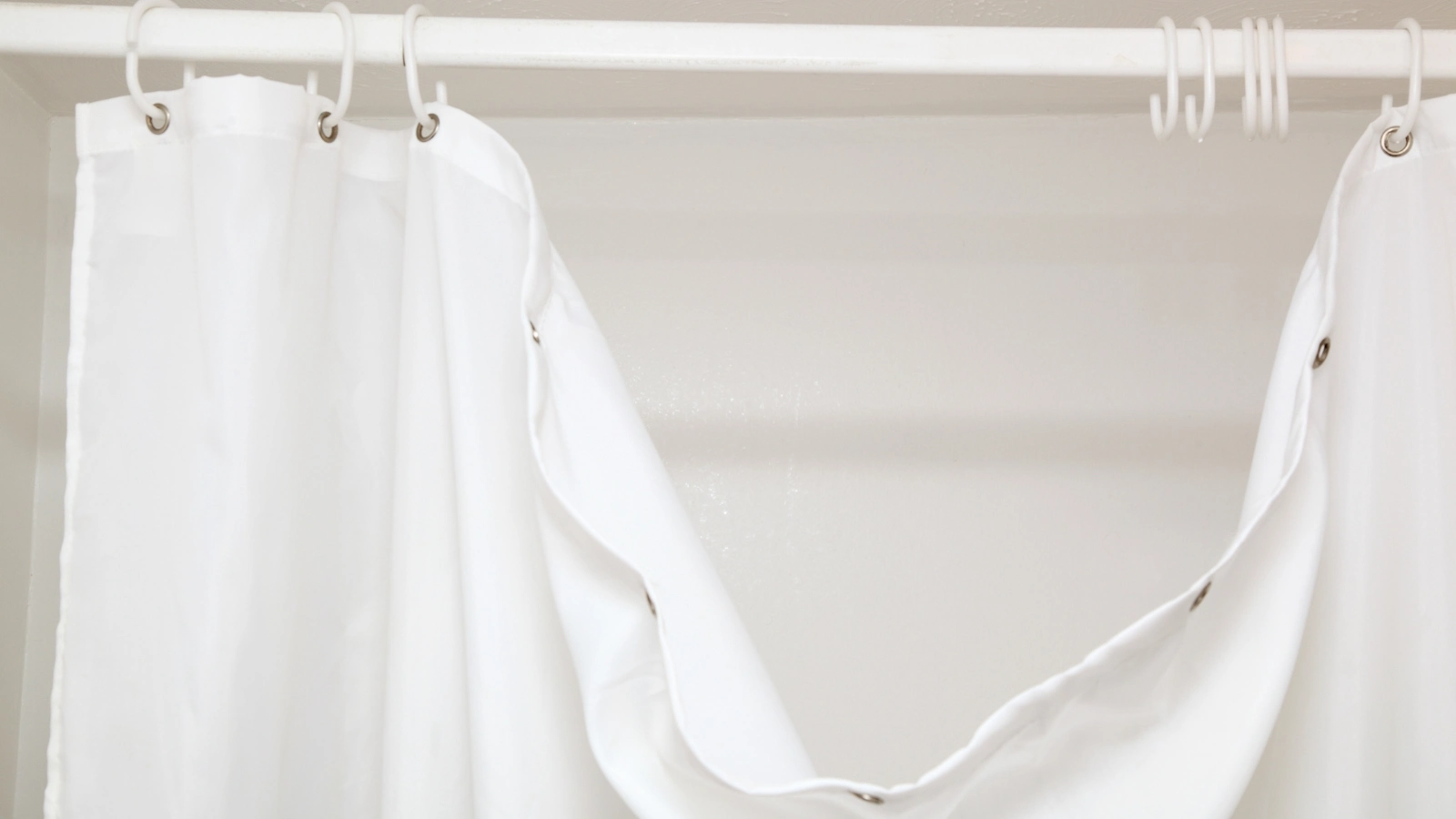
You’ve heard both sides of the shower curtain debate. But finding the right balance for your needs involves considering privacy and proper airflow.
You want to avoid mold and mildew. So, it’s crucial to adopt strategies that allow your curtain to dry quickly without sacrificing your comfort.
Let’s explore how to maintain privacy, ensure efficient ventilation, and employ alternative methods to prevent mildew buildup in your bathroom.
Privacy with an Open vs. Closed Shower Curtain
When deciding between an open or closed shower curtain, consider how much privacy you value during and after your shower. Privacy might not be a concern if you live alone or have a lock on the bathroom door. However, if you share a space or have frequent guests, a closed shower curtain can provide a sense of security.
Here’s how privacy plays out in the open vs. closed shower curtain debate:
- Closed curtains ensure privacy even if someone accidentally opens the bathroom door.
- Glass doors provide visibility, reducing privacy when the curtain is left open.
- An open curtain could be less private but signals that the bathroom is unoccupied.
- Leaving the curtain open after showering may invite privacy concerns if you forget to close the bathroom door.
Balancing Ventilation and Privacy
Balancing the need for proper ventilation to prevent mold with personal privacy preferences is key when deciding whether to leave your shower curtain open or closed. If you’re concerned about privacy but still want to keep the moisture at bay, consider this: leaving the shower curtain open after a shower can help the liner dry out more quickly, provided you have a bathroom door or window open for added ventilation.
Here’s a quick guide to help you decide:
| Concern | Shower Curtain Open | Shower Curtain Closed |
| Ventilation | Improved airflow; less mold growth | Can trap moisture; mildew risk |
| Privacy | Less privacy; visible interior | More privacy; hidden view |
| Maintenance Routine | Requires regular drying | Needs frequent washing |
Tackling Shower Mold and Mildew
While considering the balance between ventilation and privacy is important, it’s also crucial to address how to effectively tackle shower mold and mildew in the open vs. closed curtain debate. Here’s how you can keep mildew at bay:
- Keep the Shower Curtain Closed: When water isn’t running, close the curtain to prevent mildew by allowing the entire surface to dry evenly.
- Ensure Proper Drying: Make sure the shower liner dries by keeping it inside the tub. The outer curtain should stay outside.
- Use Ventilation: Leave the bathroom door or window open post-shower or run an exhaust fan to reduce humidity.
- Regular Maintenance: Wash your shower curtain frequently to prevent mold buildup and extend its life.
Alternative Mildew Prevention Strategies
To effectively prevent mildew, you can adopt several strategies beyond the simple choice of keeping your shower curtain open or closed. Regular maintenance, such as washing the plastic liner in the washing machine, can greatly hinder mildew growth. Add a cup of vinegar to your wash to break down any soap scum and disinfect the material. This is essential for mildew prevention.
| Strategy | Benefit |
| Wash with Vinegar | Disinfects and removes residue |
| Keep Plastic Liner Inside the Tub | Ensures proper airflow and drying |
| Use an Exhaust Fan | Reduces humidity to prevent mildew |
Best Practices for Shower Curtain Maintenance
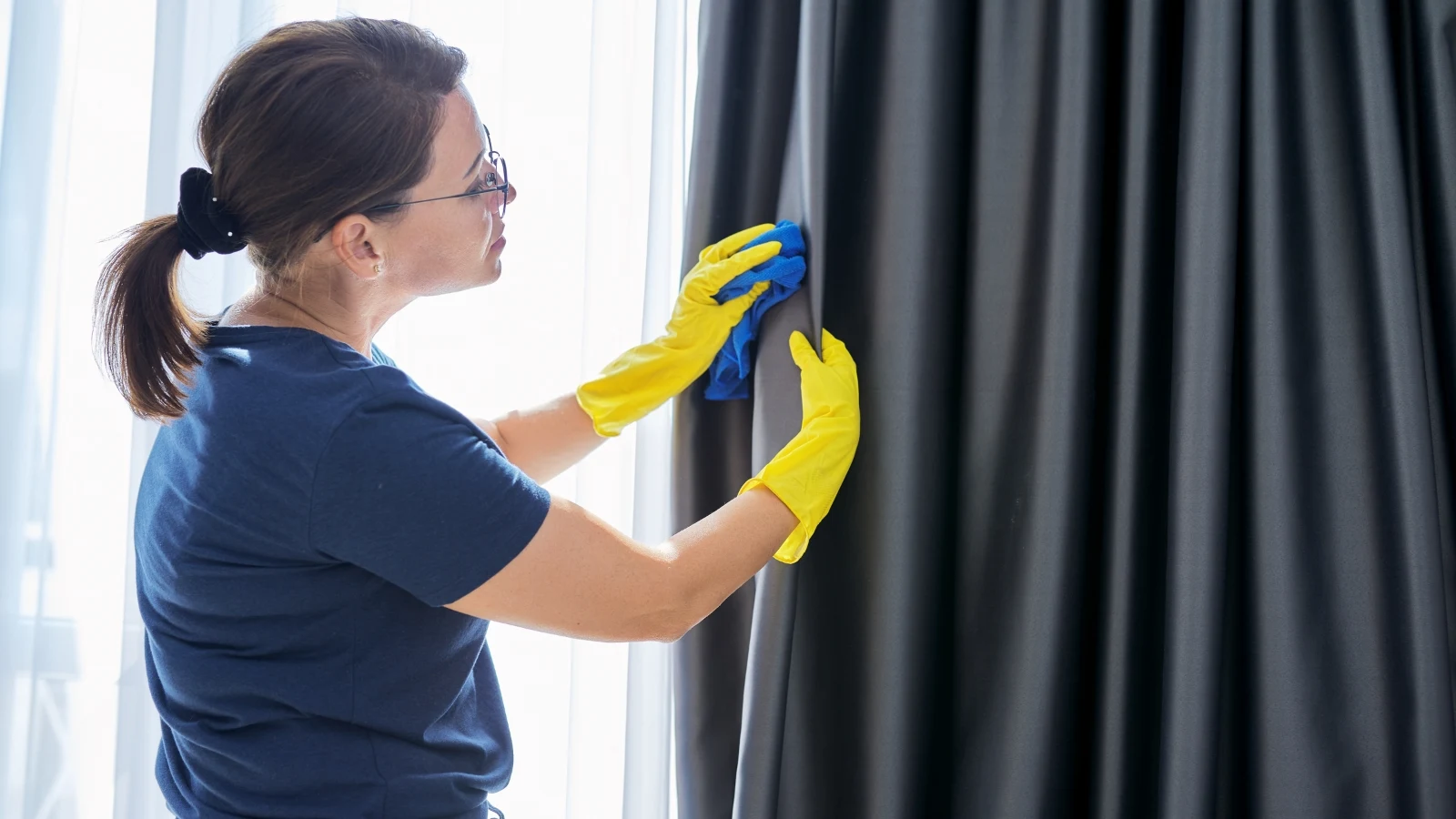
You’ll want to keep your shower curtain in top shape, so regular cleaning is a must.
Consider the material of your curtain when choosing cleaning methods, as some can be machine-washed while others need a gentler touch.
Look for recommendations that match the type of shower curtain you have to ensure it lasts as long as possible.
Regular Cleaning
Maintaining your shower curtain through regular cleaning can significantly reduce the likelihood of mold and mildew buildup. It’s not just about whether you keep your shower curtain open or closed. It’s also about how well you tackle the grime and soap scum that can accumulate.
Here are four best practices to keep in mind:
- Wash your shower curtain monthly in the washing machine using gentle detergent.
- After each shower, shake off excess water and spread the curtain out fully to dry.
- Regularly inspect for soap scum and grime, and spot clean as needed.
- Ensure your bathroom is well-ventilated to speed up drying time and minimize moisture.
These steps will help you maintain a clean and fresh bathroom environment.
Material Considerations
While regular cleaning is crucial, the type of material your shower curtain is made of also plays a significant role in its upkeep and durability. You’ve got to take material considerations seriously. If you’ve got a plastic lining, it’s waterproof, which prevents mold from growing on your shower curtain. But remember, not all materials are created equal. Here’s a quick table to guide you:
| Material Type | Pros | Cons |
| Polyester | Durable, mildew-resistant | Not as waterproof as plastic |
| Vinyl | Waterproof, inexpensive | Can be prone to off-gassing |
| Fabric | Aesthetic appeal, washable | Requires frequent laundering |
| PEVA/EVA | PVC-free, mildew-resistant | Less durable than traditional plastic |
| Cotton | Eco-friendly, stylish | Absorbs water, needs frequent washing |
Always check the care instructions specific to your shower curtain’s material to keep it looking fresh and extend its lifespan.
Recommendations for Types of Shower Curtains

Selecting the right shower curtain for your bathroom not only enhances its aesthetic but also minimizes maintenance hassles. Here’s what you should consider:
- Material: Opt for a shower curtain with a mold-resistant material. If you have a plastic liner, ensure it’s durable and mildew-resistant.
- Design: Choose a curtain that you’ll enjoy seeing both open and closed. It should complement your bathroom’s theme.
- Weight: A heavier curtain with a weighted hem will stay in place better, reducing water spillage onto your bathroom floor.
- Liner: Consider getting a separate lining if your curtain isn’t waterproof. This keeps the outer curtain dry, reducing the need for frequent washes.
Conclusion
Ultimately, it’s your call. Leaving your shower curtain open invites light and air, cutting down on mold, while closing it keeps your space tidy and extends the curtain’s life.
Balance hygiene and aesthetics by occasionally airing out the curtain and keeping it closed otherwise.
Regular cleaning is key, regardless of your choice.
So, go with your gut and keep your curtain’s maintenance in mind.
Your perfect bathroom vibe is just a pull or push away.
FAQs
Should shower curtains stay open or closed?
You might leave your shower curtain open to dry out, but closing it prevents mildew and keeps your bathroom tidy. It’s really up to your preference and bathroom setup.
What do you do with the shower curtain after a shower?
After your shower, spread the curtain out to dry. This helps prevent mold and dries it quickly, maintaining a cleaner bathroom. Regular washing also keeps it fresh and extends its lifespan.
Should shower curtains go in or out of the bath?
You should keep your shower curtain inside the bath to prevent water from spilling out and to allow it to dry properly, reducing the chance of mold and maintaining bathroom cleanliness.

